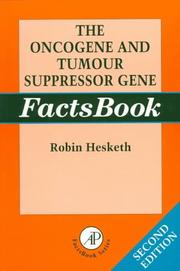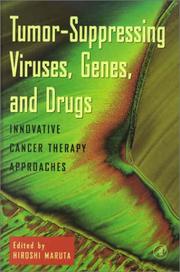| Listing 1 - 6 of 6 |
Sort by
|
Book
ISBN: 9535167448 9533078790 Year: 2012 Publisher: IntechOpen
Abstract | Keywords | Export | Availability | Bookmark
 Loading...
Loading...Choose an application
- Reference Manager
- EndNote
- RefWorks (Direct export to RefWorks)
Functional evidence obtained from somatic cell fusion studies indicated that a group of genes from normal cells might replace or correct a defective function of cancer cells. Tumorigenesis that could be initiated by two mutations was established by the analysis of hereditary retinoblastoma, which led to the eventual cloning of RB1 gene. The two-hit hypothesis helped isolate many tumor suppressor genes (TSG) since then. More recently, the roles of haploinsufficiency, epigenetic control, and gene dosage effects in some TSGs, such as P53, P16 and PTEN, have been studied extensively. It is now widely recognized that deregulation of growth control is one of the major hallmarks of cancer biological capabilities, and TSGs play critical roles in many cellular activities through signaling transduction networks. This book is an excellent review of current understanding of TSGs, and indicates that the accumulated TSG knowledge has opened a new frontier for cancer therapies.
Antioncogenes. --- Anti-oncogenes --- Cancer suppressor genes --- Emerogenes --- Tumor suppressing genes --- Tumor suppressor genes --- Cancer genes --- Tumor suppressor proteins --- Oncology
Book
ISBN: 9535171240 9535110632 Year: 2013 Publisher: IntechOpen
Abstract | Keywords | Export | Availability | Bookmark
 Loading...
Loading...Choose an application
- Reference Manager
- EndNote
- RefWorks (Direct export to RefWorks)
Tumor suppressor genes (TSGs) and their signaling networks are fast growing areas in current biomedical science. These groups of genes, which are not limited to tumor suppression, play critical roles in many cellular activities. This book, "Future Aspects of Tumor Suppressor Genes", contains some fascinating fields, from basic to translational researches, in recent TSG studies. For example, several TSG signaling pathways are addressed in this book, and both mouse and Drosophila models used for the exploration of these genes are described based on the experimental evidence. A detailed review for current knowledge of microRNA studies in the regulation of tumor growth is introduced. Additionally, how natural compounds interfere with the progression of cancer development via TSG pathways is systemically summarized. Recent progresses in cell reprogramming and stemness transition processes regulated by TSG pathways are also included in this book.
Antioncogenes. --- Anti-oncogenes --- Cancer suppressor genes --- Emerogenes --- Tumor suppressing genes --- Tumor suppressor genes --- Cancer genes --- Tumor suppressor proteins --- Molecular biology

ISBN: 1281466875 9786611466879 0080538002 0123445485 9780123445483 9780080538006 Year: 1997 Publisher: San Diego, Calif. Academic Press
Abstract | Keywords | Export | Availability | Bookmark
 Loading...
Loading...Choose an application
- Reference Manager
- EndNote
- RefWorks (Direct export to RefWorks)
The Second Edition of The Oncogene and Tumour Suppressor Gene FactsBook has been completely revised, updated, and expanded by 60%. The book contains more than 80 entries on oncogenes including JUN, MYC, and RAS, as well as DNA tumour viruses, tumour suppressor genes, including p53, retinoblastoma, BRCA1, BRCA2, VHL, F2FL, and essential material on angiogenesis and metastasis, apoptosis, cell cycle control, and gene therapy.Key Features* Includes much new data on this fast-moving field, including newly discovered oncogenes* Summarizes the clinical associatio
Oncogenes. --- Antioncogenes. --- Anti-oncogenes --- Cancer suppressor genes --- Emerogenes --- Tumor suppressing genes --- Tumor suppressor genes --- Onc genes --- Cancer genes --- Tumor suppressor proteins --- Proto-oncogenes --- Antioncogenes --- Oncogenes
Book
ISBN: 9781611223958 1611223954 9781617619861 1617619868 Year: 2011 Publisher: New York
Abstract | Keywords | Export | Availability | Bookmark
 Loading...
Loading...Choose an application
- Reference Manager
- EndNote
- RefWorks (Direct export to RefWorks)
Antioncogenes. --- Tumor suppressor proteins. --- Antioncoproteins --- Growth suppressor proteins --- Metastasis suppressor proteins --- Proteins --- Antioncogenes --- Anti-oncogenes --- Cancer suppressor genes --- Emerogenes --- Tumor suppressing genes --- Tumor suppressor genes --- Cancer genes --- Tumor suppressor proteins

ISBN: 9781559388351 1559388358 9786611057824 1281057827 0080526160 Year: 1995 Publisher: Greenwich, Conn. : JAI Press,
Abstract | Keywords | Export | Availability | Bookmark
 Loading...
Loading...Choose an application
- Reference Manager
- EndNote
- RefWorks (Direct export to RefWorks)
The underlying idea that cancer is a genetic disease at the cellular level was postulated over 75 years ago when Boveri hypothesised that the malignant cell was one that had obtained an abnormal chromatin content. However, it has been only the last decade where enormous strides have been made toward understanding neoplastic development. Explosive growth in the discipline of cancer genetics is so rapid that any attempt to review this subject becomes rapidly outdated and continuous revisions are warranted. Conclusive evidence has been reached associating specific chromosomal abnormalities to var
Antioncogenes. --- Cancer --- Oncogenes. --- Tumors --- Onc genes --- Cancer genes --- Proto-oncogenes --- Cancer genetics --- Anti-oncogenes --- Cancer suppressor genes --- Emerogenes --- Tumor suppressing genes --- Tumor suppressor genes --- Tumor suppressor proteins --- Genetic aspects.

ISBN: 1281119237 9786611119232 0080549020 9780080549026 0124762492 9780124762497 9781281119230 661111923X Year: 2002 Publisher: San Diego Academic Press
Abstract | Keywords | Export | Availability | Bookmark
 Loading...
Loading...Choose an application
- Reference Manager
- EndNote
- RefWorks (Direct export to RefWorks)
Tumor Suppressing Viruses, Genes, and Drugs profiles the new generation of cancer treatments now in development. The book examines the innovative new approaches of viral, gene, and signal therapies that promise to replace or enhance conventional methods such as surgery, radiation, and chemotherapy. The timely information presented by this book should be of interest to anyone concerned with advancing cancer treatment beyond current medical practices.
Antioncogenes. --- Cancer --- Viruses --- Genetic vectors --- Microorganisms --- Mobile genetic elements --- Extrachromosomal DNA --- Anti-oncogenes --- Cancer suppressor genes --- Emerogenes --- Tumor suppressing genes --- Tumor suppressor genes --- Cancer genes --- Tumor suppressor proteins --- Gene therapy. --- Therapeutic use. --- Treatment --- Technological innovations. --- Molecular aspects. --- Genetic aspects --- Antioncogènes --- Thérapie génique --- Aspect moléculaire
| Listing 1 - 6 of 6 |
Sort by
|

 Search
Search Feedback
Feedback About UniCat
About UniCat  Help
Help News
News